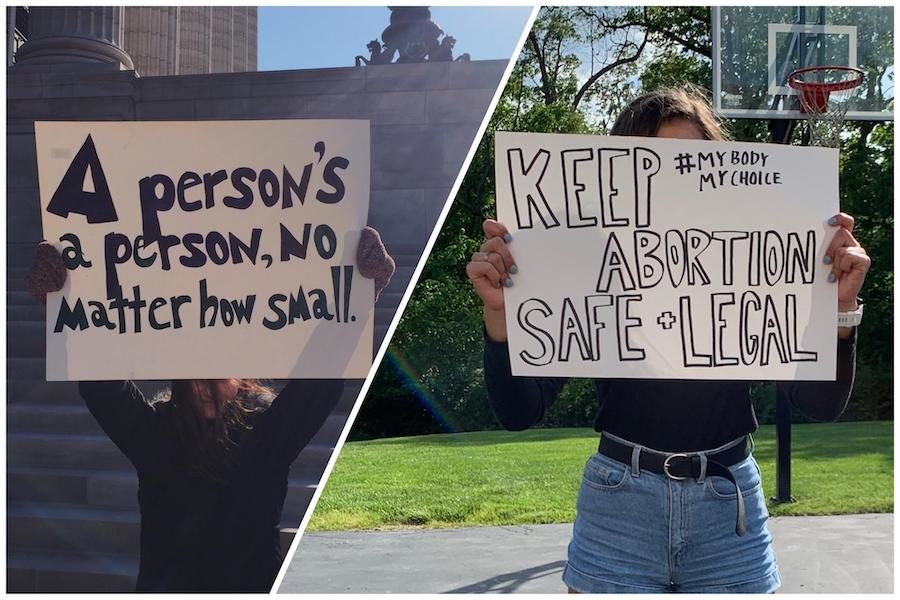Students took to social media to voice their opinions in light of the Missouri General Assembly passing H.B. 126, a bill restricting abortion that Governor Mike Parson is expected to sign into law within a week. The bill, which would instantly become one of the most stringent abortion policies in the U.S., stirred up controversy between pro-life and pro-choice advocates.
“I feel like [the bill] is something that needs to be talked about. If nobody talks about it, it’s just going to be like, ‘alright we passed a law, it’s over now,’ which is the case for a lot of things,” junior Zane Alshekhlee said. “Personally, as long as posting on social media brings awareness to others, that’s a win in my book. I know me alone is not going to do anything, but if I could just at least say, ‘hey this is going on, can you all open your eyes for once,’ that would mean a ton.”
The bill, outlawing almost all abortions eight weeks after conception, makes Missouri the fifth state to pass what is known as a “heartbeat bill.” However, pro-life activist and sophomore Molly Reinecke feels that the bill should have gone further.
“I think it’s a good step towards no more abortions and all babies getting to live. It’s obviously a good step to eliminate abortion when the heartbeat starts, but it could be better by eliminating all abortions,” Reinecke said. “It’s a step in the right direction, but I don’t think there should be any time frame. Saying that there isn’t a heartbeat shouldn’t justify that it’s not going to be a human being and it shouldn’t have a chance for life at all.”
H.B. 126 allows exceptions for medical emergencies but not for pregnancies caused by rape or incest.
“Being pro-choice is important to me because as a young women, I know me and many of my friends’ biggest fear is being raped. That’s just kind of a norm. Keys sticking out in your hands when you’re walking, looking around really fast–guys don’t have to worry about that,” Solodar said. “That’s a constant fear that you have–the thought that that could happen to anyone one of us. If this bill goes through, we won’t have the option of abortion if we end up getting pregnant, and it’s scary. It’s my body and my uterus. It’s important to me because the government should not get to decide what I do with my body. That is up to me. This could begin a process of deeply infringing on the rights of women.”
While pro-life supporter and junior Brooklynn Urban agrees that abortion should be allowed in cases of rape, her personal adoption experience affects the way she views the issue.
“If someone is raped, they should have the right to abort the baby. Personally, I wouldn’t, but I know that some women cannot handle that. My parents were young and addicted to drugs and not fit to have children, so the idea of abortion was in the air for me. It was possible, but they decided to keep me. If they didn’t, I wouldn’t have been here,” Urban said. “There are so many arguments about kids going into foster care and into the system, but I am living proof of going through the system and finding a family because I was adopted.”
Urban argues that people who have the possibility of becoming pregnant should know and understand the risks.
“In my opinion, if you think you’re responsible enough to have sex, then you should be responsible enough to know to use protection, and you should be responsible enough to know the risks,” Urban said. “I believe that unborn children should not be killed because their parents made a mistake and couldn’t fix it. That’s on them and not the child.”
After seeing these arguments made on social media, Solodar researched the pro-life movement to better understand the other side of the abortion debate.
“I watched some pro-life videos; it was very hard, but I wanted to try to understand those arguments. My mind didn’t change, but I hope that the other side can do some research too. We currently have a middle ground, and that’s the Roe v. Wade case,” Solodar said. “Just try to think about everyone else that already has a heartbeat and already has a life. Give us a listen before you ignore us because we are scared. If you do not have a uterus, this does not affect you, so please protect us. If you don’t want to have an abortion, don’t have one, that’s fine, but you have to leave it open for other people.”
As other state legislatures voted to pass new laws, including an Alabama bill prohibiting abortion after six weeks, activity surrounding the issue skyrocketed across social media platforms, sparking hundreds of thousands of posts May 15 alone. Solodar, along with other students, shared posts on their Instagram story explaining their beliefs.

Social media posts mentioning the word “abortion” mounted on Facebook, Twitter, Instagram and YouTube amidst newly-passed abortion legislation.
“I hope we can convince people that if they never want an abortion, they can never get one, but they can also accept that for other people, abortion might be the right choice. Pro-choice does not mean pro-abortion, it just means that we’re not generalizing the needs of every single person who has a uterus,” Solodar said. “I hope that we can show [lawmakers] that we are also constituents and we also matter. I hope we can open peoples’ minds. I hope [this debate] remains peaceful and as polite as possible with this being a very passionate thing.”
In response to the bill, students and activists across St. Louis are planning a protest for reproductive rights May 25 at Union Station.
“A lot of us are feeling lost because this is taking control away from us. The desire to do something is very strong for those of us that are passionate about it. We want to be able to go out and show all of the government officials that we’re not joking around and that this is serious. I can’t imagine myself not being a part of the movement,” Solodar said.
Pro-life students also plan to continue to spread awareness about their movement.
“I saw a lot of pro-choice arguments that could be so easily refuted recently, and I thought, ‘why is no one else doing this?’ so I decided to post on social media,” Urban said. “They have valid arguments, and it’s definitely a sensitive topic. Overall, if you mess up because you were irresponsible, that should not affect the life of an unborn child.”
A divisive issue across the country for years, abortion continues to be a hot topic today as a new generation of voters reach adulthood. The Missouri bill, once signed by Parson, will go immediately into effect due to an emergency clause; however, it is expected to trigger a court challenge that could either reverse the bill or overturn Roe v. Wade.






![Smiling in a sea of Longhorns, Fox 2 reporter Ty Hawkins joins junior Darren Young during the morning Oct. 3 pep rally. The last time West was featured in this segment was 2011. “[I hope people see this and think] if you come to [Parkway] West, you will have the time of your life because there are so many fun activities to do that make it feel like you belong here. I was surprised so many people attended, but it was a lot of fun,” Young said.](https://pwestpathfinder.com/wp-content/uploads/2025/10/Edited2-1200x798.jpg)
![West High seniors and families listen as a representative of The Scholarship Foundation of St. Louis, Teresa Steinkamp, leads a Free Application for Federal Student Aid (FAFSA) workshop. This session, held in the library, provided guidance on financial aid, scholarships and student loan options. “This event is very beneficial for any seniors who are applying to or considering applying to colleges after high school [because] the cost of college is on the rise for seniors and parents,” college and career counselor Chris Lorenz said.](https://pwestpathfinder.com/wp-content/uploads/2025/09/DSC_4478-1200x778.jpg)
![Senior Kamori Berry walks across the field during halftime at the Homecoming football game on Sept. 12. During the pep assembly earlier that day, she was pronounced Homecoming Queen. “I thought it was nice that the crowd [started] cheering right away. I know [my friends] were really excited for me, and my family was happy because typically non-white people don't win,” Berry said.](https://pwestpathfinder.com/wp-content/uploads/2025/09/DSC7046-Enhanced-NR-1200x798.jpg)



![Pitching the ball on Apr. 14, senior Henry Wild and his team play against Belleville East. Wild was named scholar athlete of the year by St. Louis Post-Dispatch after maintaining a high cumulative GPA and staying involved with athletics for all of high school. “It’s an amazing honor. I feel very blessed to have the opportunity to represent my school [and] what [it] stands for,” Wild said.](https://pwestpathfinder.com/wp-content/uploads/2025/05/unnamed-6-1200x714.jpg)
![The Glory of Missouri award recipients stand with their certificates after finding out which virtue they were chosen to represent. When discovering their virtues, some recipients were met with contented confirmation, while others, complete surprise. “I was not at all surprised to get Truth. I discussed that with some of the other people who were getting the awards as well, and that came up as something I might get. Being in journalism, [Fellowship of Christian Athletes and] Speech and Debate, there's a culture of really caring about truth as a principle that I've tried to contribute to as well. I was very glad; [Truth] was a great one to get,” senior Will Gonsior said.](https://pwestpathfinder.com/wp-content/uploads/2025/04/Group-Glory-of-Missouri.jpg)

![After a thrilling point, senior Katie Byergo and junior Elle Lanferseick high-five each other on Oct. 8. With teamwork and camaraderie, Byergo worked together in the game against Lafayette High School. “[Byergo’s] is really positive with a good spirit,” Lanferseick said. “I set her [the ball] and she hits it [or] gets the kill.”](https://pwestpathfinder.com/wp-content/uploads/2025/10/DSC_9349-1-e1761159125735-1200x791.jpg)
![Focused on providing exceptional service, sophomore Darsh Mahapatra carefully cleans the door of a customer’s car. Mahapatra has always believed his customers deserve nothing less than the best. “[If] they’re trusting us with their car and our service, then I am convinced that they deserve our 100 percent effort and beyond,” Mahapatra said.](https://pwestpathfinder.com/wp-content/uploads/2025/10/DSC_0018-1200x800.jpg)
![Sophomore Aleix Pi de Cabanyes Navarro (left) finishes up a soccer game while junior Ava Muench (right) warms up for cross country practice. The two came to Parkway West High School as exchange students for the 2025-2026 school year. “The goal for the [exchange] program is to provide opportunities for both Parkway students and our international exchange students to learn about other cultures, build connections and become confident, capable, curious and caring — Parkway’s Four C’s — in the process,” Exchange Program Lead Lauren Farrelly said.](https://pwestpathfinder.com/wp-content/uploads/2025/10/Feature-Photo-1200x800.png)
![Leaning on the podium, superintendent Melissa Schneider speaks to Parkway journalism students during a press conference. Schneider joined Parkway in July after working in the Thompson School District in Colorado. “My plan [to bond with students] is to get things on my calendar as much as possible. For example, being in [classes] is very special to me. I am trying to be opportunistic [meeting] kids [and] being in [the school] buildings. I have all the sports schedules and the fine arts schedules on my calendar, so that when I'm available, I can get to them,” Schneider said.](https://pwestpathfinder.com/wp-content/uploads/2025/09/IMG_5425-1200x943.jpeg)
![Gazing across the stage, sophomore Alexis Monteleone performs in the school theater. The Monteleone family’s band “Monte and the Machine” has been releasing music since 2012, but Alexis started her own solo career in 2024 with the release of her first single, Crying Skies. “My whole family is very musical, [and I especially] love writing [songs with them],” Monteleone said.](https://pwestpathfinder.com/wp-content/uploads/2025/09/DSC7463-1200x798.jpg)
![Leaping through the air, senior Tyler Watts celebrates his first goal of the season, which put the Longhorns up 1-0 against the Lafayette Lancers. Watts decided to play soccer for West for his last year of high school and secured a spot on the varsity roster. “[Playing soccer for West] is something I had always dreamed of, but hadn’t really had a good opportunity to do until now. It’s [really] fun being out [on the field], and I’m glad I decided to join the team. It’s just all about having fun with the boys and enjoying what time we have left together,” Watts said.](https://pwestpathfinder.com/wp-content/uploads/2025/09/DSC_1951-1200x855.jpg)

![Shifting global trade, President Donald Trump’s tariffs are raising concerns about economic stability for the U.S. and other countries alike. “[The tariffs are] going to pose a distinct challenge to the U.S. economy and a challenge to the global economy on the whole because it's going to greatly upset who trades with who and where resources and products are going to come from,” social studies teacher Melvin Trotier said.](https://pwestpathfinder.com/wp-content/uploads/2025/05/MDB_3456-1200x800.jpg)
![Red, white and blue, the American flag holds the values of our democracy. The fight that we once endured has returned, as student journalists and senior correspondents across the country are losing their voices due to government control. “[Are] the White House and [the] government limiting free speech [and] freedom of the press? Yes [they are],” chief communications officer of the Parkway School District and former journalist Elisa Tomich said.](https://pwestpathfinder.com/wp-content/uploads/2025/03/Untitled-design-14.jpg)
![Freezing in their position, the Addams Family cast hits the “rigor mortis” pose after cast member and senior Jack Mullen, in character as Gomez Addams, calls out the stiff death move. For the past four months, the combined company of cast members, orchestra pit, crew and directors all worked to create the familial chemistry of the show. “I’m excited for [the audience] to see the numbers, the music, the scenes, but I also just love all the technical aspects of it. The whole spectacle, the costumes, makeup and the people that put in the work backstage in order to make the show successful on stage. I’m excited for people to see and appreciate that,” Mullen said.](https://pwestpathfinder.com/wp-content/uploads/2025/03/DSC0116-1200x800.jpg)

